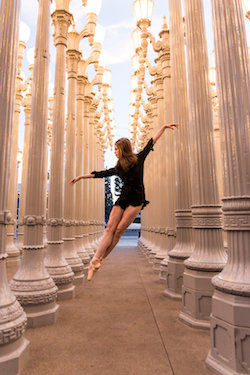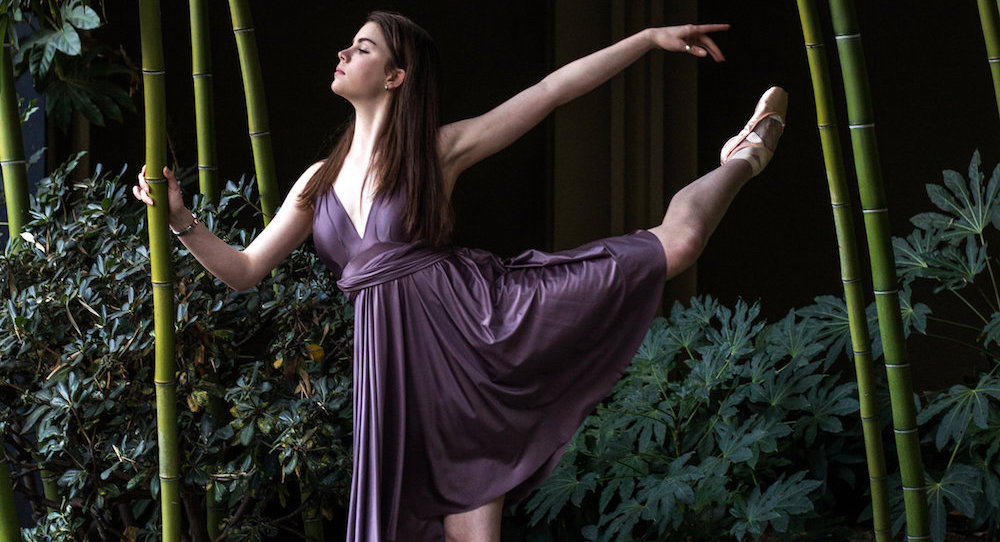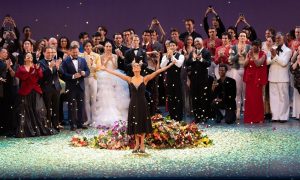No one ever said that dancing, and a life in dance, is easy. Challenges of this life include competition from other dancers and choreographers, physical fatigue, and a relatively short span of adulthood when performing is physically feasible. Yet, within so many dancers, a passion for the art form persists. How to ease this tension between aspirations and reality? What we might call the “Tim Gunn” attitude can help; “make it work!”

Carolynn Rowland.
Gunn hosted the hit television show, Project Runway, and would often use that phrase (which became his tagline) with contestants. Saying this, he most often wanted them to think broadly, creatively, optimistically and outside-of-the-box. Carolynn Rowland, marketing coordinator for Só Dança, presents a similar attitude in regards to making life in the dance world work; probe what’s possible, don’t be afraid to draw outside the lines, and redirect rather than give up. Here, learn howRowland shifted her career yet still remained working in dance, the gifts that dance training can offer for other endeavors, the importance of getting an education and more.
What has been your journey in the dance world?
“My ballet journey began a bit later than most due to the fact that I did not start classically training until I was almost 13 years old. My first classical ballet school was in Fort Lauderdale, Florida, at Magda Auñon School of Classical Ballet. Training with Magda opened the doors for me to attend the Next Generation Ballet in Tampa, Florida, under the direction of Peter Stark.
I was always intrigued by the Balanchine style, and therefore dreamed about attending the School of American Ballet. With all of that being said, the Next Generation Ballet was the perfect place for me because it was a stepping stone school. Peter, along with the other teachers, had a plethora of knowledge about other styles of ballet. This really boosted my level of talent to eventually audition for SAB that following summer.
At age 15, I attended SAB’s summer course and was invited to the Winter Term. After spending three years in the school, I was offered a corps de ballet contract with the Los Angeles Ballet. At the moment, I am presently deep into my second year with the company. Not an incredibly lengthy career, but a professional career nonetheless.”
What personal qualities and what kinds of choices helped these opportunities come to fruition for you?
“Given the fact that my ballet education was a bit delayed, I always felt as though I had to prove everyone wrong, I had to be the exception, and I had to work my absolute hardest to be the best I could be. Moreover, I realized early on that I was my biggest hindrance, and once I pushed past the fact that I was (and am) imperfect, that was when I found the most freedom and liberty in my art form.
A time off from dancing (due to injury) truly prepared me for my long-term business goals. I buckled down and focused on academics and expanded my horizons in the visual art realm. As a matter of fact, I would bring my school work to the Metropolitan Museum of Art so I could study in an inspiring setting. Whenever I was there, I would always bring my sketchbook and draw my feelings and surroundings. It was my escape during a difficult injury. Instead of crossing my fingers, praying my body would heal, I realized that life does not revolve around ballet. There were (and are) so many other avenues of work that I could pursue and still find a sense of fulfillment and joy.
Moreover, these hours drawing and soaking in as much art and academics as possible allowed me to tap into a completely different part of me. I strongly believe that rekindling my love for visual arts landed me my job with Só Dança. When thinking back on how my life has panned out with injuries, academic school choices and ballet school choices, I would not change a thing. I feel strongly about always having an attitude of contentment; it allows for so much peace in the work field.”
Do you think higher education dance programs help their students prepare for work in business or other high-performance careers? How might they do this better?

Carolynn Rowland in Los Angeles Ballet’ The Nutcracker’. Photo courtesy of Rowland.
“I am a huge advocate for education. Due to the fact that dancers’ schedules are inconstant, ‘Distance Learning’ is a fantastic option. I began my university life, for lack of a better phrase, while I was at SAB. I attended Florida Atlantic University while I was in NYC because they offered Distance Learning. There are deadlines, but for the most part, scheduling is very flexible. I would challenge those around me to take a class or two so that they can obtain their undergraduate degree while in a company.”
If dance students don’t find these opportunities in higher education, what other options might they find? For instance, might internships be useful in this regard?
“Learning a skillset is wonderful, and an internship might foster an amazing environment for honing a new skill.
Dance, in it of itself, teaches a plethora of disciplines. Moreover, so much of our day-to-day routine, as professional dancers, is sought after in a professional environment. I hate to admit it, but I have yet to receive my undergraduate degree (I am working toward it), and I am the Marketing Coordinator for Só Dança. It is crazy to think that I have been entrusted with this much authority given my age and academic standing. With all of that being said, if you prove yourself to be an asset to a company, they cannot help but admire you.”
What might you suggest for dancers interested in getting involved in dance-related businesses? How might one get a foot in the door, so to speak?
“One of the first things that comes to mind is the fact that so many brands (dance manufacturing companies, smaller health brands, physical therapists, doctors) try to associate themselves with ballet companies. Take a minute to think of the New York City Ballet. They have many associations with various dance manufacturing brands and health specialists. Ask those in authority about how you can get plugged in with brands that sponsor your company. Trust me, if a dance manufacturing company was sought out after by a professional dancer, they would be elated!”
What might you suggest for dancers seeking to be entrepreneurs?
“As dancers, we know what is lacking in the industry – from lack of physical care (physicians that are not familiar with dance) to certain products that would make our pointe shoes feel so much better (just to give an example). With these things in mind, dancers can branch out on their own and create products that are worthwhile and/or be the physical care that is lacking in this industry. We are artists, and are therefore always creating. Take the time to find a need, and fill it!”
How would you advise dancers form their longer-term vision – career goals, and balancing performing and other endeavors?

Carolynn Rowland. Photo courtesy of Rowland.
“I have found that in all companies, regardless of size, dancers’ rehearsal schedules vary in intensity. To be more specific, on some days during the season, you might just have company class and an hour rehearsal, but on other days you might be rehearsing or performing for a vast amount of time. These infrequencies in schedule, in my opinion, really allow for us as dancers to go out of our comfort zone and explore other avenues of work.
I should mention layoffs. ‘Layoff’ is most dancers’ worst nightmare; in my case, I adore it! It has given me the opportunity to invest more in Só Dança, and Só Dança has, in turn, been able to invest in me. In regards to giving advice, my main takeaway token would be not to be afraid of being busy! We are only young and vibrant for so long; take advantage of your youth. Use the beginning of your ballet (or any other dancing career) to kick start your long-term goals. Know exactly what you want to do, and make it happen. As dancers, we have been trained at such a young age to be disciplined. Take that practice and apply it in a ‘normal’ workplace.
Many dancers might say, ‘I don’t know what else I am interested in besides dancing.’ I would challenge that statement by saying, well, there are so many avenues of work in the dancing realm without actually dancing. Within a ballet company, you have the artistic staff. See if there is anything that sparks your interest there, and explore the education required for those jobs. How can you invest your time wisely? Are you reading books that are expanding your knowledge and broadening your horizons, for instance?”
By Kathryn Boland of Dance Informa.















